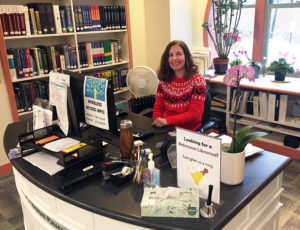
Reference librarian Laura Paryl and her colleagues are the library’s “in-house detectives” for finding resources.
By Lucy Maulsby
The Lincoln Public Library may be small, but its reference librarians are always busy. In addition to answering routine questions (over 100 a week) about the library’s holdings, directing patrons to “a good book,” and assisting with research on a variety of topics, they’re also teaching people how to access and effectively use the expansive electronic library of books, journals, and other media — all of which are transforming the ways in which we engage with news, entertainment, and information.
“My work has always involved helping people find what they’re looking for, helping them use the tools available, and solving problems,” reference librarian Kate Tranquada said. But those tools and problems have changed a great deal. When she first started working as a librarian in Waltham, “the card catalog filled the lobby and we had a few computers in use at the library — for staff use only. We were just getting everything barcoded — lots of data entry. Checkout still involved punching cards and pockets in books. Music and books on cassette had not quite replaced the vinyl record collection.”
The library offers both the old and the new, subscribing to a rich array of electronic resources even as it continues to build a robust print collection. These resources include subscriptions to national and local newspapers such as the New York Times and Boston Globe as well as the millions of news, magazine, and journal articles available through General One File.
Digital books, audiobooks, and movies can be accessed through the library catalogue as well as through Hoopla (movies, music, audiobooks, e-books, comics, and TV shows), Overdrive (e-books, magazines, audiobooks, and videos), and Kanopy (documentaries, classics, and independent films).
Helping patrons learn about and use these resources is central to the library staff’s work. “Although the market for print books is expanding, publishers are no longer printing many reference books. These resources are now available only in digital formats,” reference librarian Laura Paryl noted. She and the other reference librarians help patrons understand what is and isn’t available online (from social services to movies) and how to access that information. They’re also experts at helping patrons evaluate the quality of information available through online platforms.
In order to provide technological assistance, reference librarians answer questions via email, phone, and, as always, in person (on the first floor to the left of the entrance in the reference room).
“The library has always been a place for the public to get their hands on the latest dominant technology. We work with people who can use help getting up to speed on current tools,” Tranquada said. “We also provide equipment for experts whose computers and printers are temporarily on the blink, or for people away from home. Next to meeting so many people, my favorite part of the job has been learning how to use all the new gadgets and programs as they become available.”
To better help resolve technical issues and set up accounts through which patrons access digital books, Tranquada holds 30-minute drop-in help sessions on Thursdays from 3–5 p.m. She helps people install apps and download materials onto their personal devices including iPhones, iPads, Android devices, and Kindles. In addition, she makes regular visits to The Commons and can sometimes be found at Bemis Hall during their computer drop-in sessions on Thursdays at 1:30 p.m.
The library’s core collection now includes a wide range of digital subscriptions that allow patrons to research diverse topics. Subscriptions to Britannica Digital Learning and World Book open doors to learners of all ages on an expansive range of topics.
“The online versions are much easier to use — no need to consult multiple heavy volumes just to find the magazine article you need,” Tranquada said. “Sometimes it’s been hard for old-timers like me to part with the gorgeous volumes that were once as valuable as gold to us. The challenge is letting people know we still offer many of the same expensive reference tools. But now they’re more invisibly digital: there are no bookcases full of volumes reminding people what the library offers.”
Since space is not as much of a concern as it once was, the reference material at the library has expanded to include new kinds of resources. For patrons interested in family history and heritage, online databases such as Heritage Quest — which includes federal censuses, books, and bank records — offer access to extraordinary collections. In addition, digital copies of some local public records and archives are available through the Lincoln Archives. For information about accessing these, patrons can email Lincoln’s archivist, Lisa Welter, at archives@lincolntown.org.
The library also subscribes to indexes that offer practical information about and ratings of goods, services and investments such as Consumer Reports, Consumer’s Checkbook, Morningstar, and Value Line.
The secret to finding all the digital riches available is through the library website: www.lincolnpl.org. Under the Services tab, select Research Tools to see resources listed by subject. If you have a question — any question — you can bring it to a reference librarian. And if the librarians can’t find the answer, they’ll refer you to someone who can.
Lucy Maulsby is the Lincoln School Committee’s appointee to the Library Board of Trustees.

Love our Librarians. Thank you!
excellent article! a great interview with the librarians and thoroughly shared with the squirrel readers. thank you, Lucy!